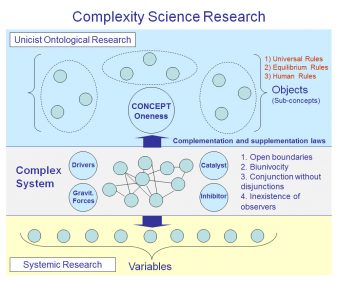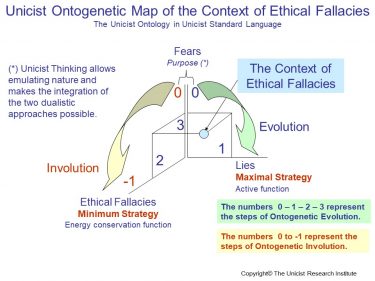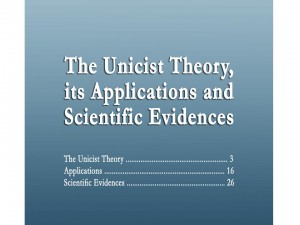The Unicist Theory, developed by Peter Belohlavek at The Unicist Research Institute, changed the paradigms of the scientific approach to complexity. It made a logical approach to complex adaptive systems possible, making them reasonable, understandable and manageable. It integrated Complexity Sciences and Systemic Sciences in a unified field.
The Unicist Theory emulates the organization of nature by introducing unicist objects to drive business processes, institutional processes and social processes. You can access the complete document at http://www.unicist.org/repo
 Overview
Overview
What is the Unicist Theory?
It is the theory that explains the nature of things.
What does the wording “nature of things” mean?
The nature of an entity is defined by its functionality in an environment, which has an underlying conceptual structure that emulates the intelligence that underlies nature.
What does the intelligence of nature mean?
It means that the functionality of every natural entity is driven by a purpose, an active and entropic principle that drives changes and an energy conservation principle that sustains the purpose.
What is the knowledge of the nature of things needed for?
To know what we are doing or talking about in order to better adapt to the environment, which implies influencing the environment while being influenced by it.
How reliable is this knowledge?
This knowledge is fully reliable because it deals with the conceptual functionality of things. It solves the empirical probabilistic approach of most systemic sciences.
When is the application of the Unicist Theory necessary?
It is necessary to diagnose, build strategies and design architectures in adaptive environments like businesses, institutions, social behavior and future research.
What happens if it is not used when dealing with complex adaptive environments?
When the nature of an entity is not considered, the capacity to adapt is lost and is replaced by dominating, opposing or submitting to the environment.
Which are the limits of its application?
The limits are given by the capacity of individuals to apprehend the concepts that underlie facts.
The Basic Breakthroughs that sustain the Unicist Theory
1) The discovery of the Ontogenetic Intelligence of Nature that regulates the evolution of living beings.
2) The discovery that Complex Adaptive Systems do not include variables but include objects that are interrelated by biunivocal multiple relationships.
3) The discovery of complementation and supplementation as the unique types of relationships in Nature.
4) The discovery of Human Ontointelligence that allows apprehending the concepts that underlie the nature and things.
Introduction
The objective of the development of the Unicist Theory was to find a structural solution to deal with complex adaptive systems considering their characteristics. Complex adaptive systems have, among other aspects, open boundaries and are integrated by the conjunction of their elements. In such systems, there is no possibility for the existence of observers.
The Unicist Theory, based on the discovery of the ontogenetic intelligence of nature, allowed developing the four scientific pillars that provided the basics of the unicist logic based and objects driven technologies to manage human complex adaptive environments: Conceptual Economics, Conceptual Anthropology, Conceptual Psychology and Conceptual Management.
The Unicist Theory was originated by the need of finding responses to the question of why things happen in the social and economic world in order to influence evolution. It was triggered by the need of going beyond the empirical Know How that was used in the 70s to approach complex adaptive environments and the need to integrate it with a “Know Why”, that was inexistent.
The author developed an inductive approach to complex environments, which implied that he began at an operational level dealing with complex adaptive systems and entered deeper and deeper until the Unicist Theory was born. This theory was born when the structure of the concepts that underlie facts was discovered.
Then he began the application and research work to find the structure of concepts in the field of complex adaptive systems, beginning with biology and ending with social sciences and future research. This research work was possible due to the development of the unicist ontological research methodology that changed the paradigms of sciences to approach complexity.
The Theory itself
The research in complexity sciences to manage complex adaptive systems that led to the discovery of the Ontogenetic Intelligence of Nature and the Unicist Theory began in 1976. It was led by Peter Belohlavek and included the following discoveries and developments: Unicist Ontology, Unicist Logic, Unicist Conceptualization, Ontogenetic Maps and Unicist Objects.
 The Unicist Theory was developed to manage the nature of complex adaptive entities.
The Unicist Theory was developed to manage the nature of complex adaptive entities.
On the one hand, to approach the nature of things an individual needs to be able to apprehend the essential patterns that underlie the operational patterns that are observable.
But, on the other hand, complex adaptive entities have open boundaries, which imply that the individual, who intends to influence the environment is part of the system, which makes traditional systemic science research methods fallacious.
In this context, the Unicist Ontological Research Methodology was developed to transform complex problems into manageable problems.
The Unicist Theory needs to be apprehended using the ontointelligence any individual has. It defines the individual’s capacity to apprehend the nature of things in adaptive environments.
It has to be considered that 3-5 year old children use their conceptual approach to reality to adapt to an environment that fully exceeds their rational comprehension by posing and endless questioning on the “WHY” of things.
Ontointelligence is necessary to manage reality as a unified field. This is necessary when dealing with complex adaptive systems. Ontointelligence is the deepest human intelligence that allows apprehending the nature that underlies observable facts. It is integrated by ethical intelligence, strategic intelligence and the logical type of thinking of individuals.
You can access the complete document at http://www.unicist.org/repo
Scientific Dissemination Committee
NOTE: The Unicist Research Institute was the pioneer in using the unicist logical approach in complexity science research and became a private global decentralized leading research organization in the field of human adaptive systems. It has an academic arm and a business arm.
https://www.unicist-school.org/complexity-sciences/wp-content/uploads/2015/04/turi.pdf











